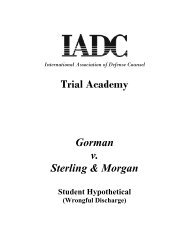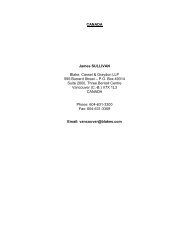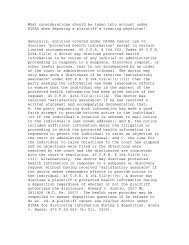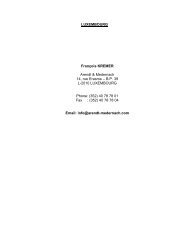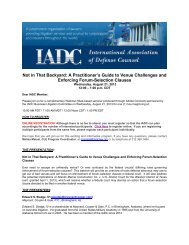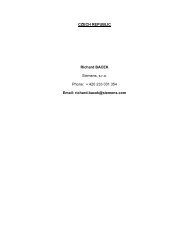Defense Counsel Journal - International Association of Defense ...
Defense Counsel Journal - International Association of Defense ...
Defense Counsel Journal - International Association of Defense ...
You also want an ePaper? Increase the reach of your titles
YUMPU automatically turns print PDFs into web optimized ePapers that Google loves.
Page 456 DEFENSE COUNSEL JOURNAL–October 2012has no opportunity to defend. 8 Whilepunitive damages cannot be awarded aspunishment for injuries suffered bynonparties, juries are allowed to considerthe harm to nonparties in determining adefendant’s reprehensibility. 9 Thus, theDue Process Clause requires states toprovide juries with adequate legalguidance, and to use procedural tools thatensure juries are accounting for the harmcaused to nonparties to determinereprehensibility only, and not to punishthe defendant for such harm tononparties. 10 The Court <strong>of</strong>fered littleguidance on how states should providethese safeguards, providing only that“[a]lthough the states have someflexibility to determine what kind <strong>of</strong>procedures they will implement, federalconstitutional law obligates them toprovide some form <strong>of</strong> protection inappropriate cases.” 11 With this decision,the Supreme Court challenged courts todevelop procedures that ensure juriesengage in appropriate inquiries and reachpunitive damage awards that account forthe reprehensibility <strong>of</strong> defendants’conduct without punishing them based onharm to nonparties.The Supreme Court spoke again onthe issue <strong>of</strong> punitive damages in June2008 in Exxon Shipping Co. v. Baker. 12That case considered the validity <strong>of</strong> a $5million punitive damage award againstExxon arising out <strong>of</strong> 1989 Exxon Valdezoil spill. The Court reduced the punitivedamages verdict by half, and limited theratio <strong>of</strong> compensatory to punitive8 Id at 353.9 Id. at 357.10 Id. at 355.11 Id. at 357 (emphasis in original).12 Exxon Shipping Co., 554 U.S. 471 (2008).damages to 1:1 in maritime cases. 13Although the holding is limited tomaritime law, the opinion <strong>of</strong>fersinteresting commentary on the problems<strong>of</strong> punitive damage awards and somesolutions that have been formulated toaddress those problems.The Exxon Court noted that, despitestates’ efforts to limit damages awards bysetting statutory limits and maximumratios on punitive to compensatorydamages, punitive damage awards are“higher and more frequent in the UnitedStates than they are anywhere else.” 14The Court noted that the “real problem[<strong>of</strong> punitive damages] is the starkunpredictability <strong>of</strong> punitive awards.” 15“Courts <strong>of</strong> law are concerned withfairness [and] consistency,” but theevidence illustrates that factually similarcases <strong>of</strong>ten result in inconsistent punitiveawards. 16 For example, in two cases with“strikingly similar facts,” the juriesawarded comparable compensatorydamages, but one jury awarded $4 millionin punitive damages and the other did notaward any punitive damages. 17 In theExxon Court’s discussion <strong>of</strong> how toeliminate this unpredictability, the Courtsuggested “pegging punitive tocompensatory damages using a ratio ormaximum multiple” as an alternative tohard dollar caps, which do not accountwell for inflation. 18 This suggestionfocuses on the injury <strong>of</strong> the plaintiffs bytying the amount <strong>of</strong> punishment to the13 Id. at 515.14 Id. at 496.15 Id. at 499.16 Id.17 BMW <strong>of</strong> N. Am. v. Gore, 517 U.S. 559, 565n. 8 (1996).18 Exxon Shipping, 554 U.S. at 506.



